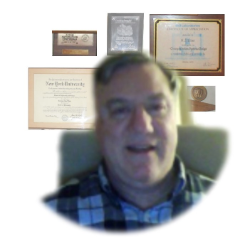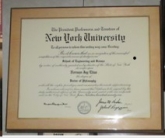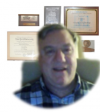| Viewed: | 332 times |
| Visitors: | 198 |
| Registered: | 11/14/2019 |
| Last Online: | 11/15/2019 |
| Will Travel: | 5 miles |
Norman Elias
| Subject | Age/level and price |
|---|---|
Electrical Engineering lessons and courses |
College - $30
- 60min
Adult Education - $40
- 60min
|
| Sun | Mon | Tue | Wed | Thu | Fri | Sat | |
|---|---|---|---|---|---|---|---|
| AM |
10-12
|
11-12
|
8-12
|
11-12
|
|||
| PM |
12-11
|
12-11
|
12-11
|
12-4
|
7-11
|
||
| Schedule. Times are in Eastern Time | |||||||
| Institution | City | Specialty | Degree | Class |
|---|---|---|---|---|
| New York University | New York City | Electrical Engineering | Doctor | 1971 |
| New York University | New York City | Electrical Engineering | Master | 1967 |
| City College of New York | New York City | Electrical Engineering | Bachelor | 1966 |
Teaching/tutoring has been a common thread throughout Dr. E.' 48+ year career spanning Bell Labs, Philips Research, and most recently 16 years as an independent consultant in simulation and modeling. He has taught circuit theory at Fairfield University's school of electrical engineering, transmission system design at Bell Labs' In-Hours Continuing Engineering program, Simulation and modeling for Philips Lighting Electronics, HW/SW cosimulation seminars sponsored by Mentor Graphics and Ansoft. Today he is offering his expertise as a private tutor in Electrical Engineering with specialties in circuit theory, simulation and behavioral modeling languages. Over the years Dr. E. has recorded numerous original innovations. He is the author of the Pass-Fail tolerance optimization methodology, the E. index for statistical sensitivity analysis, the Bell Labs module compiler for integrated logic synthesis, and a patented VHDL-AMS based instruction-set simulation model for HW/SW cosimulation. He is currently investigating frequency domain modeling of Pulse-Width modulators for high frequency simulation of switch mode power supplies. Tutoring has become a passion for Dr. www.*** He recognizes that students learn by actively working homework and study problems. The tutor's role is not to solve problems while the student watches but to observe and coach while the student solves the problem. He has coached students by preparing instructive problems of his own that introduce complex concepts one step at a time. Throughout the process Dr. E. follows a casual, supportive mentality guided by the recollection that he too had to start from scratch to learn each new topic. With this tutoring philosophy he has watched his students progress from complete confusion to total fluency in new subject matter. His methods have raised test scores by a full grade and established friendships that outlast the tutoring assignment. |







